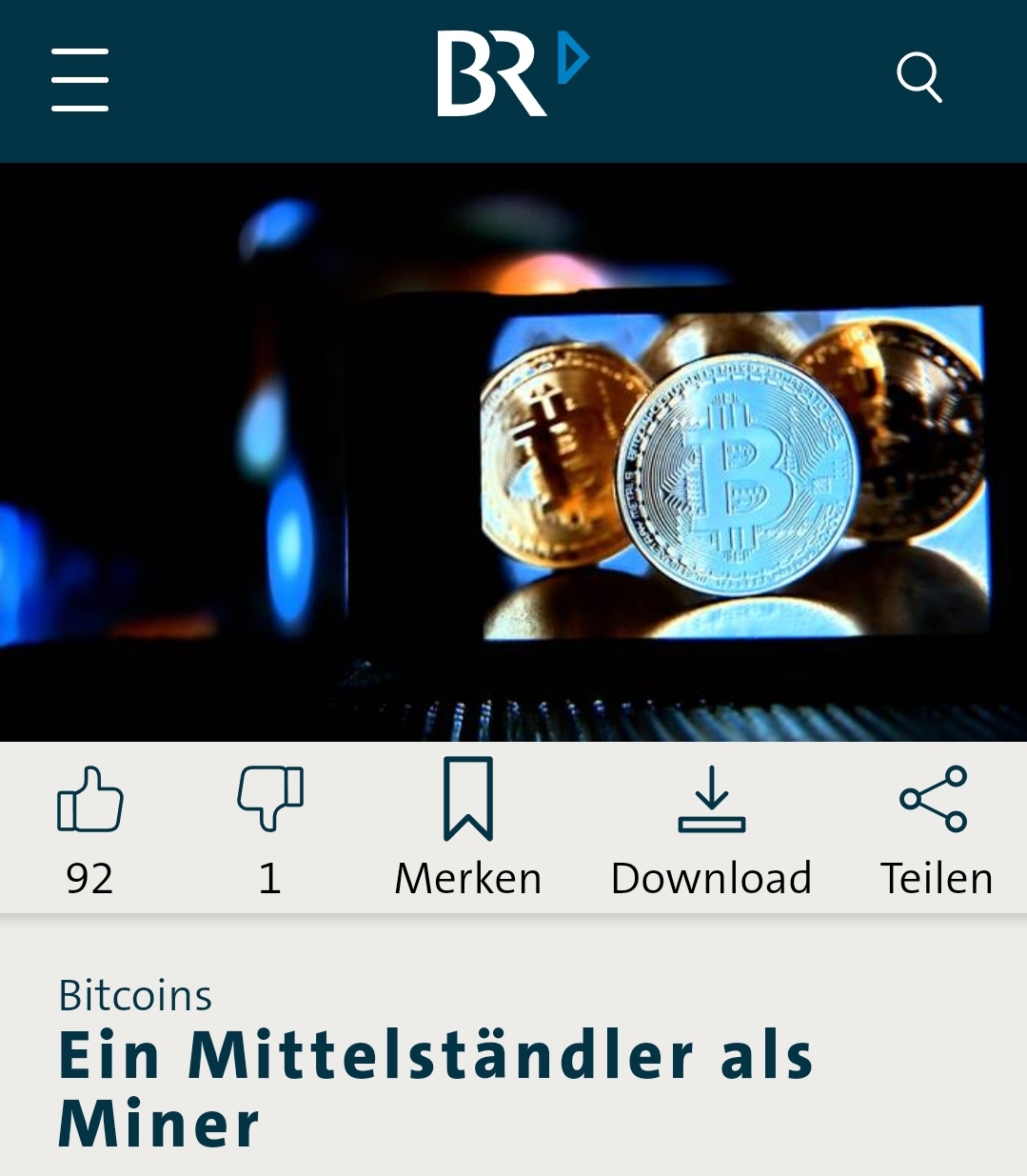"Die gesamte Debatte rund um Bitcoin und Energie ist so verdreht, dass es wehtut".

Kristian Kläger aus Augsburg. Er ist Unternehmer und Leiter einer Firmengruppe mit rund 300 Mitarbeiter:innen, und seit 2021 ist er leidenschaftlicher Bitcoiner. Mit seinem neuen Mining-Unternehmen terahash möchte er die Aufklärung rund um Bitcoin und Energie vorantreiben und mit den zahlreichen Missverständnissen aufräumen.
Ich bin überzeugt: Wer in Deutschland oder Europe energieintensiv produzieren will, muss seinen eigenen Strom erzeugen", sagt Kristian. Was natürlich direkt zur Frage führt: Was geschieht mit dem Strom, wenn der Betrieb ihn akut nicht benötigt? Eine Frage, die alle Erzeuger von erneuerbarer Energie sich auch stellen müssen.
Daher glaubt Kristian Kläger auch, dass Bitcoin-Mining einen wichtigen Beitrag zur deutschen Energiewende leisten kann.
Sogar der Bayrische Rundfunk hat darüber berichtet...
https://www.br.de/mediathek/video/bitcoins-ein-mittelstaendler-als-miner-av:63c18a66798d4100084f03e5
Mein persönliches Fazit:
Auch ich habe mir für dieses Jahr zum Ziel gesetzt, meine Photovoltaikanlage zu erweitern. Die letzten Planungen mit der Fachfirma für Solaranlagen sind fast abgeschlossen. Die Warteliste ist lang. Dennoch bin ich gewillt am Ball zu bleiben. Die Stromabzocke der letzten Monate hat mir gezeigt, dass es an der Zeit ist die Stromerzeugung zu dezentralisieren. Ich will dabei sein. Deshalb hat meine Frau auch ein Elektroauto bestellt, um der Abzocke an der Tankstelle zu entgehen.
Was aber, wenn im Sommer zu viel Strom da ist? Und meine Frau mit dem Elektroauto unterwegs ist? Den überschüssigen Strom mit einem Asic Miner in digitales Gold verwandeln?
Nur noch bis zum 30.06.2023 bekomme ich meinen Strom für 20 Cent. Ich bin gespannt, ob die Stadtwerke Pforzheim den Vertrag überhaupt verlängern...

Bitcoin-Mining könnte mir eventuell helfen, die Amortisationszeit der PV-Anlage von 11 Jahren auf wenige Jahre zu reduzieren. Aber selbst das Elektroauto verkürzt die Amortisationszeit bereits um die Hälfte!
English
"The whole debate around bitcoin and energy is so twisted it hurts."

Kristian Kläger from Augsburg. He is an entrepreneur and head of a group of companies with about 300 employees:inside, and since 2021 he is a passionate Bitcoiner. With his new mining company terahash, he wants to advance the education around Bitcoin and energy and clear up the numerous misunderstandings.
I am convinced: If you want to produce energy-intensive in Germany or Europe, you have to generate your own electricity," says Kristian. Which of course leads directly to the question: What happens to the electricity when the business does not acutely need it? A question that all renewable energy producers must also ask themselves.
That's why Kristian Kläger also believes that bitcoin mining can make an important contribution to Germany's energy transition.
Even the Bayrische Rundfunk has reported about it....
https://www.br.de/mediathek/video/bitcoins-ein-mittelstaendler-als-miner-av:63c18a66798d4100084f03e5
My personal conclusion:
I have also set myself the goal for this year to expand my photovoltaic system. The last planning with the specialized company for solar plants is almost finished. The waiting list is long. Nevertheless, I am willing to stay on the ball. The electricity rip-offs of the last months have shown me that it is time to decentralize power generation. I want to be part of it. That's why my wife has also ordered an electric car to avoid the rip-off at the gas station.
But what if there is too much electricity in the summer? And my wife is on the road with the electric car? Turn the excess electricity into digital gold with an Asic Miner?
I only get my electricity for 20 cents until June 30, 2023. I am curious if the Stadtwerke Pforzheim will extend the contract at all....

Bitcoin mining could possibly help me to reduce the payback time of the PV system from 11 years to a few years. But even the electric car already cuts the payback time by half!

